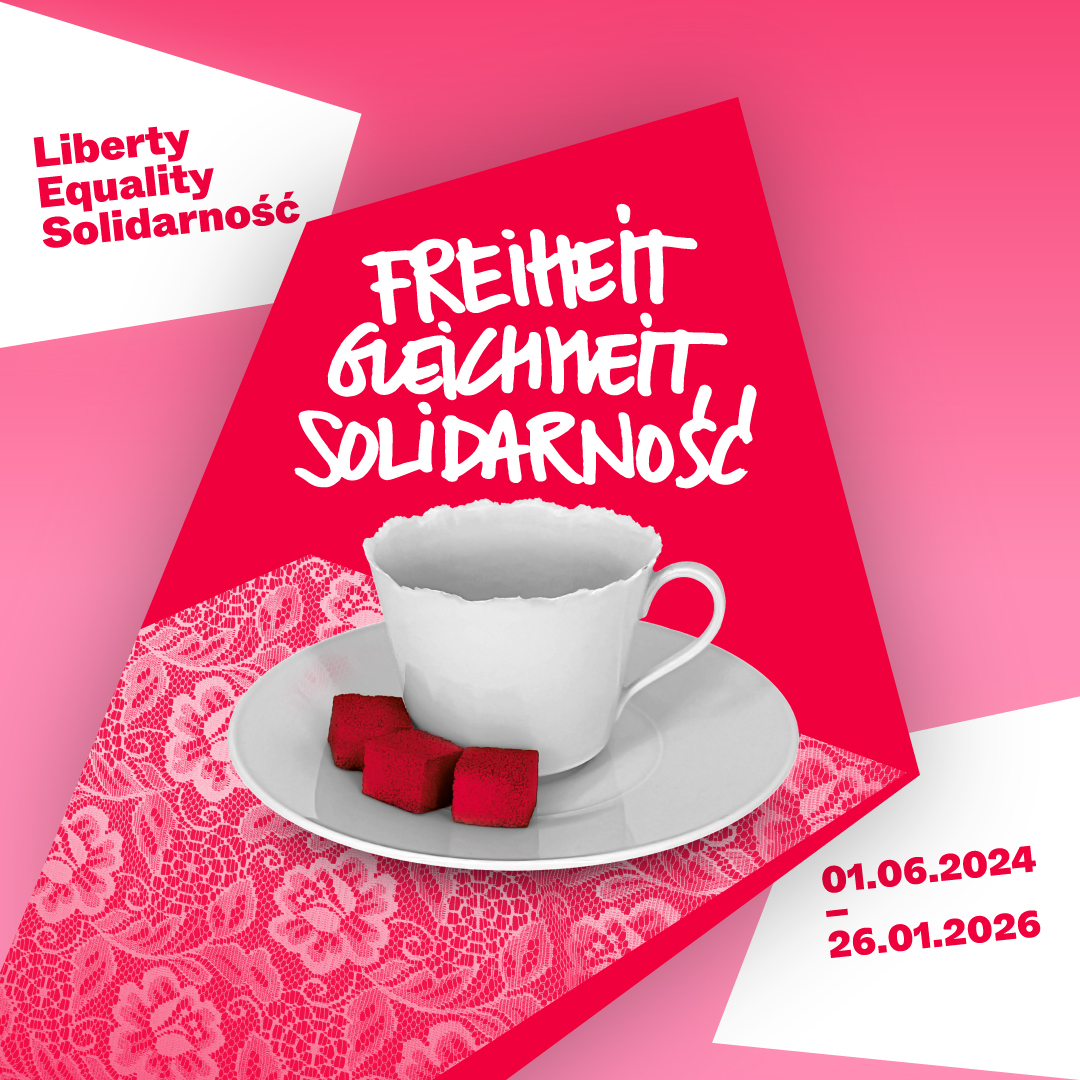Liberty, Equality, Solidarność
Sat, 1 June 2024 – Mon, 26 January 2026
| The open space is part of the BERLIN GLOBAL exhibition. |
| English, German, Polish |
| 1st Floor, Room 110 |
| Opening hours Mon, Wed, Thu, Fri, Sat, Sun: 10:30 am – 6:30 pm Tue: closed |
Poles have lived in Berlin for centuries and shaped the cultural, social, political and economic life of the city. The Polish border is less than 100 kilometres away. And yet, the city’s close ties with its neighbouring country sometimes only become visible at a second glance.
The Open Space “Liberty, Equality, Solidarność”[1] in the BERLIN GLOBAL exhibition looks at Berlin as a site of Polish struggles for freedom and against discrimination, as well as a place of dialogue and solidarity.
The multi-layered installation by Ewa Maria Slaska, Anna Krenz and Jemek Jemowit introduces visitors to seven sites in Berlin where Polish people have fought for freedom, equality and solidarity. Spread throughout the city, they include the Olympic Stadium, the Warschauer Brücke, Moabit Prison and Volkspark Friedrichshain. The Open Space also shares Polish perspectives on everyday life in Berlin, moving between a sense of belonging and experiences of discrimination. It explores the traces of historical power relations and the ways they affect coexistence.
The Open Space invites visitors to share their different points of view and engage in dialogue, even when the topics are difficult. In doing so, the Open Space itself becomes a further place of Polish-Berlin solidarity.
Poland’s history is characterised by partitions by Prussia, Russia and Austria in the 18th and 19th centuries, by German exploitation and extermination during the Second World War and by Soviet foreign influence from 1945 to 1989. Against this backdrop, Poles repeatedly fought for their freedom, campaigned for equal rights and built structures of solidarity – including in Berlin.
[1] “Wolność, Równość, Solidarność” (Liberty, Equality, Solidarity) was a slogan used by striking shipyard workers in Gdansk in August 1980, who later formed the Solidarność trade union. This succinct and powerful variation of the historical slogan of the French Revolution can still be heard today at pro-democracy protests in Poland.
The artists
Ewa Maria Slaska
Born in Poland in 1949, writer, editor, publicist, blogger, project manager, translator, teacher and curator Ewa Maria Slaska also sees herself as a mediator between German and Polish realities. She fled to Berlin in 1985 as a political activist in the Solidarność movement and has been working in refugee aid ever since. She has been involved in many projects over the past 40 years, including the independent TV show “Magazyn Wyspa” (“Island”), WIR e.V. – Verein und Verlag zur Förderung der deutsch-polnischen Literatur and the German-Polish Poets’ Steamer.
Anna Krenz
Born in 1976 in Poznań, Poland, the artist, architect, author and activist Anna Krenz has lived in Berlin since 2003. She is the founder of the collective Dziewuchy Berlin and the association Ambasada Polek e.V. Since 2001 she has worked with the Danish Centre for Renewable Energy (Folkecenter for Renewable Energy) on sustainable development projects. Anna Krenz is part of the women’s project studio Sinus_3, which combines architecture, ecology, visual arts and public space design. From 2003 to 2012, she co-directed the ZERO Gallery in Berlin, which hosted more than 100 exhibitions, concerts and happenings with artists from Poland, Germany and around the world.
Jemek Jemowit
Born in Gdynia, Poland in 1986, Ziemowit Nowak is better known by his alter ego, goth-glam musician Jemek Jemowit. Since 2009, his genre-spanning artistic journey has shaped the musical landscape with a political and conceptual approach. In addition to his performance and music activities, Nowak has run the art and culture venue TROPEZ at the Humboldthain summer pool in Berlin’s Wedding district since 2019.
Media partners



